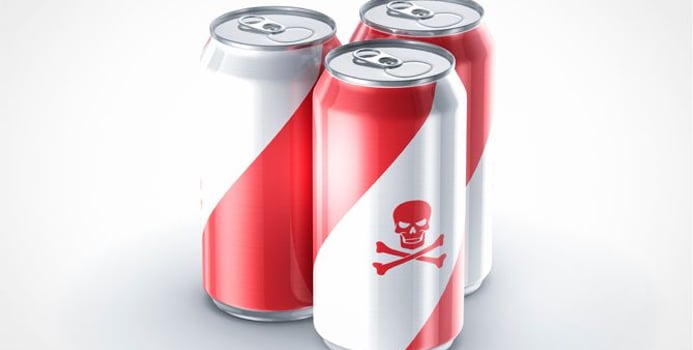Many people don't know about the nutrition of diet soda. They think diet soda is "good for you" because it doesn't contain any calories, fat or sugar. The problem is that diet soda doesn't contain any nutrition at all. Most of the ingredients in diet sodas are synthetic chemicals. Some diet soda chemicals are believed to cause cancer. Here are five ingredients found in the nutrition of diet soda.
1. Aspartame
Aspartame is an artificial sweetener found in most diet soda. Aspartame is suspected to cause cancer and it has also been linked to Alzheimer's disease. Some have the PKU gene and they cannot process phenylalanine (an amino acid found in Aspartame). If people with the PKU gene consume phenylalanine, they will suffer neurological damage and possibly death. Phenylalanine is an essential amino acid found in many dairy products. In its natural form, phenylalanine combines with other amino acids. In isolation, phenylalanine could have adverse health effects.
2. Phosphoric Acid
Phosphoric acid is an ingredient in diet soda (and in many regular sodas) which produces a tangy flavor. Phosphoric acid can deplete the body of the calcium it needs to promote strong bones and healthy teeth. Chronic consumption of the phosphoric acid found in diet soda can be particularly detrimental for people under 30, because their bones have not reached maturity. Excess amounts of phosphoric acid have also been linked to kidney disease and the formation of kidney stones.
3. Caffeine
Caffeine is not bad, as far as nutrition goes. The problem with the caffeine found in diet soda is that is it artificial, whereas in coffee and tea, the caffeine is naturally occurring. Synthetic caffeine is metabolized differently in your body than it would be if it were combined with the nutrients of coffee or tea, creating a synergistic effect. Additionally, many people consume diet soda to satisfy their thirst; this is actually counterproductive. Caffeine is a diuretic and it can dehydrate you when consumed in large quantities. Many people who consume diet soda drink it continuously throughout the day. One 12 ounce can of diet soda can contain anywhere from 50 to 80mg of caffeine.
4. Acesulfame Potassium
Acesulfame potassium is another artificial sweetener used instead of aspartame. Individuals who consume acesulfame potassium often believe they're being healthier because they're not consuming phenylalanine (the amino acid found in aspartame). The reality is that the long term health effects of artificial sweeteners are unknown. Studies have shown that acesulfame potassium can cause tumors and brain damage even when not consumed excessively. Acesulfame potassium can also cause hypoglycemia.
5. Potassium Benzoate
The nutrition of diet soda contains the ingredient potassium benzoate. Potassium benzoate is a preservative added to diet soda to protect the flavor while it sits on the shelves. Potassium benzoate can form the known carcinogen benzene when combined with vitamin C and sodium. Many diet sodas are fortified with vitamin C and almost all contain sodium.
The general consensus is that the nutrition in diet soda is not any better (and is probably worse) than the nutrition found in regular soda. For the best nutrition, one should eliminate regular and diet soda from their diet. Instead, sip on 100 percent fruit juice or water.



